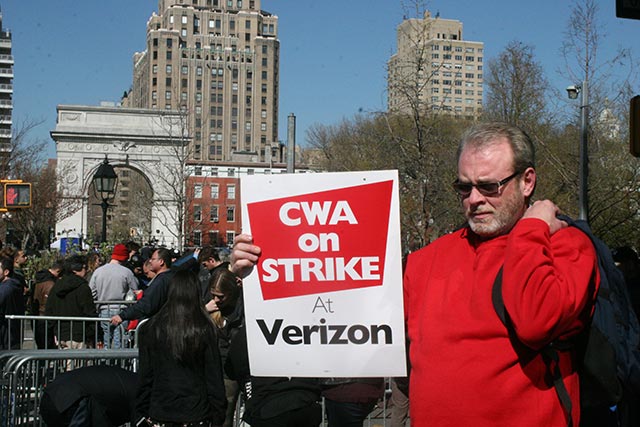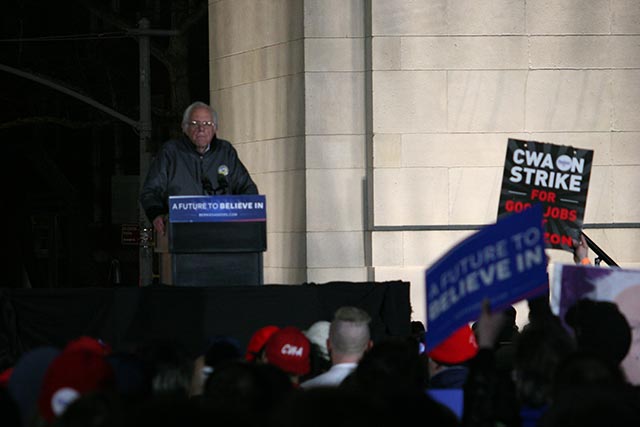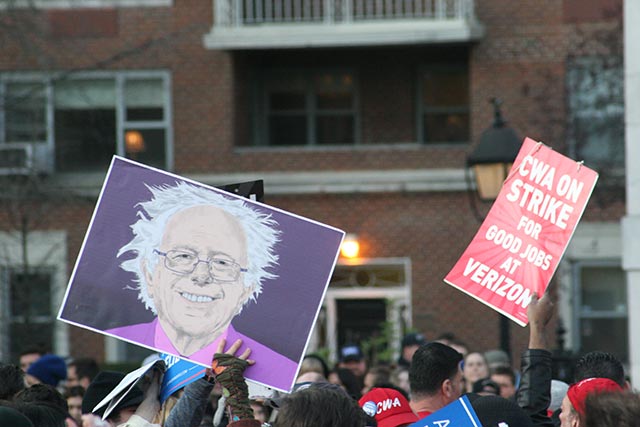
Part of the Series
Beyond the Sound Bites: Election 2016
Did you know that Truthout is a nonprofit and independently funded by readers like you? If you value what we do, please support our work with a donation.
A labor strike by the Communications Workers of America (CWA) served as the centerpiece Wednesday of Sen. Bernie Sanders’ rally in New York City, where even his most plugged in supporters said they’d settle for slower internet if it meant the CWA would win.
With Donald Trump and Hillary Clinton getting the lion’s share of airtime on cable news, Sanders’ campaign has relied on the internet to get its message out to supporters, many of them young people voting for the first time. Many young people in the United States also rely on the internet for almost every aspect of their daily life, from getting around to getting an education.
Despite bringing in thousands of non-union workers to cover striking CWA workers’ jobs, Verizon warned customers this week that “they may experience service interruptions as [the company] works to solve issues with union leaders,” PennLive reported.
Seeking better pay and working conditions, CWA members said that they wondered if young people understood that their electronic lives don’t happen through magic, but through the sweat and blood of blue-collar workers.
“I don’t know. They should ask their parents. Ask them how they grew up, how everything was built,” said Terry Loughland, 52, who has been with Verizon for 28 years, beginning back when it was Bell Atlantic. “It takes a lot to build this communications infrastructure. It doesn’t just come. But how’d it get there? How’d you get there? I’m middle class. People might think I’m making a lot of money but I’m not. I got three kids in college, and I’m barely getting by.”
 Longtime Verizon worker Terry Loughland, 52, says he wonders if the youth today understand how the internet takes a lot of effort to keep running. (Photo: Wilson Dizard)
Longtime Verizon worker Terry Loughland, 52, says he wonders if the youth today understand how the internet takes a lot of effort to keep running. (Photo: Wilson Dizard)
Although Loughland said he wasn’t completely convinced Sanders is the better choice compared to Clinton, he did appreciate Sanders coming out to speak to the CWA strikers.
“Sanders seems to be more for us,” he said.
 Bernie Sanders speaks at a campaign rally in New York City’s Washington Square Park on Wednesday. (Photo: Wilson Dizard)
Bernie Sanders speaks at a campaign rally in New York City’s Washington Square Park on Wednesday. (Photo: Wilson Dizard)
At the workers’ rally, Sanders called Verizon “another major American corporation trying to destroy the lives of working Americans,” The Huffington Post reported.
Sanders received an endorsement from the CWA in December 2015. The union represents Truthout’s staff workers.
“Verizon is one of the largest, most profitable corporations in this country,” Sanders told striking Verizon workers. “[The company wants] to outsource decent-paying jobs. They want to give their CEO $20 million a year.”
Some of the youngest Sanders supporters, now just graduating high school with little recollection of the world before Facebook and the iPhone, said they would give up connectivity if it meant workers would win.
Even some high school seniors pledged to give up the internet in solidarity with the workers — even for a month.
“I would support the CWA and not Verizon,” said Malena Suarez, 17, from Queens, who hopes to study political science. “I think that by supporting Verizon you are just indulging in a toxic capitalist society we live in. But to support the workers is to support our First Amendment right to strike. It’s the voice of the people we’re hearing and not the voice of the corporations.”
 Bernie Sanders speaks at a campaign rally in Manhattan’s Washington Square Park on Wednesday. (Photo: Wilson Dizard)
Bernie Sanders speaks at a campaign rally in Manhattan’s Washington Square Park on Wednesday. (Photo: Wilson Dizard)
Oscar Salazar, 20, a student at Westchester Community College, stood by the fountain in Manhattan’s Washington Square Park wearing a T-shirt covered in photos of Sanders’ face. He’d bought the apparel online. Yet even if it meant having to deal with slower internet speeds, Salazar said he’d support a strike.
“They deserve to have a living wage,” he said, along with “all the rights that come with a living wage [like] the time off work … it’s not right for them to live in New York City where it’s very expensive.”
“Even if I had no internet, I would be able to adapt,” the computer science and political science student said. “I feel like we would make it work. We shouldn’t punish the workers.”
 A strike by the Communications Workers of America served as the centerpiece Wednesday of Vermont Sen. Bernie Sanders rally in Manhattan. (Photo: Wilson Dizard)
A strike by the Communications Workers of America served as the centerpiece Wednesday of Vermont Sen. Bernie Sanders rally in Manhattan. (Photo: Wilson Dizard)
The vice president of the New York University College Democrats, Michael DeLuca, 21, who is studying political science and Mandarin Chinese, said he was willing to make that temporary trade-off — slower internet in the service of workers’ rights — but said it wasn’t necessary.
“I don’t think those kinds of sacrifices are needed. Businesses have had to compensate for this kind of thing forever. They can afford to treat their workers properly and also offer the same level of service,” he said.
“I’m comfortable with some disruption in the short term. That’s how we get a lot of the progress we see in this country. But in the long term, the burden is on the business to treat their workers fairly and then deal with the costs of that,” DeLuca added.
Sanders went on to deliver a stump speech that used the CWA endorsement to draw a contrast between his campaign and Clinton’s. He encouraged voters to turn out next week and hailed his campaign’s ability to raise millions from ordinary people, not corporations.
“We don’t want their money,” he said to cheers.
Press freedom is under attack
As Trump cracks down on political speech, independent media is increasingly necessary.
Truthout produces reporting you won’t see in the mainstream: journalism from the frontlines of global conflict, interviews with grassroots movement leaders, high-quality legal analysis and more.
Our work is possible thanks to reader support. Help Truthout catalyze change and social justice — make a tax-deductible monthly or one-time donation today.